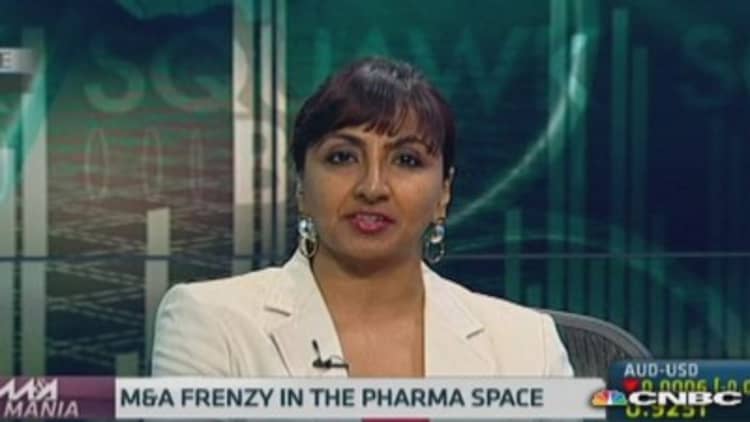The fight against the spread of deadly "superbugs" has reached the halls of Congress. The Senate and House both have put forth new proposals on battling drug-resistant, sometimes deadly bacteria—with ideas that include more antibiotic development and higher Medicare payments for their use.
But there's concern among health analysts over just how to combat the drug-resistant bugs that are killing an estimated 23,000 men, women and children in the U.S. every year.
"What we've been doing is not working. We need a whole new approach to handling them and to stop bacterial growth," said John Palisano, professor of biology at Sewanee, University of the South.
Sen. Sherrod Brown, D-Ohio, introduced his Strategies to Address Antimicrobial Resistance (STAAR) Act earlier this month. In essence, the bill calls for an increased federal emphasis to strengthen prevention, research efforts and coordination among agencies when it comes to tracking superbug bacteria. Brown is holding a press conference Wednesday to formally announce the legislation.
Read More
In an email statement to CNBC, Brown's office said, "Senator Brown believes that addressing antimicrobial resistance requires a multi-faceted approach ... and that while we need new antibiotics ... the STAAR Act lays the groundwork on the next steps for addressing antimicrobial resistance."
On the House side, Rep. Peter Roskam, R-Ill., and Rep. Danny Davis, D-Ill., put forth their proposal in March: The Developing an Innovative Strategy for Antimicrobial Resistant Microorganisms (DISARM) Act.
Among its goals, DISARM calls for tracking down obstacles in fighting antibiotic-resistant bacteria, and recommends cutting red tape between government agencies.
Increased payments for drugs
DISARM also urges increased Medicare reimbursement payments to hospitals for using advanced antibiotics to fight superbugs.
In an email to CNBC, Roskam's office said the current Medicare reimbursement policy for hospitals pays around "$10 or less for each antibiotic that could cost hundreds of dollars to use.. so hospitals tend to use them less, which results in companies not developing them."
The higher payments would be revenue-neutral for Medicare, with eventual savings through shorter hospital stays and lower readmission rates, according to Roskam's office. The exact increase would need to be worked out between drug companies and insurers.
The hope is that hospitals will use more of those expensive drugs, and then pharmaceutical companies will produce new ones—something they're not doing much of now. Experts say only three new antibiotics have entered the marketplace in the last five years.
Read MoreOregon quits Obamacare biz; feds pick up the slack
"It's crucial to get the Medicare payment restructure in place," said Barrett Thornhill, executive director of the Antimicrobial Innovation Alliance (AIA), a coalition of pharmaceutical companies and a major backer of DISARM.
"It's very expensive to develop the stronger antibiotics," said Dr. Marco Taglietti, executive vice president of drug development and research and chief medical officer at Forest Laboratories, which is a member of AIA.
"DISARM would have less constraint when it comes to tight financial rules and making sure hospitals feel comfortable to explore using the drugs," explained Tagiletti, who said Forest Labs has one strong antibiotic on the market, Teflaro, and is developing another.
Fears of overusing better drugs

However, some health-care experts are cautious about hospitals being financially rewarded for using the costlier drugs.
"It's not because of low Medicare reimbursement that hospitals do or don't use the current stronger antibiotics," said Dr. Allison Bartlett, an infectious disease physician at La Rabida Children's Hospital in Chicago. "It's because the drugs need to be used as a last resort in treatment when all else fails."
It's possible that the financial incentive could end up making the stronger antibiotics useless, as other drugs have become, said Ryan Moenster, a professor at the St. Louis College of Pharmacy and a practicing pharmacist.
"We can't just prescribe the stronger antibiotics without fear of overusing them," he said.
Roskam's office denied that the proposed payment changes would qualify as incentives, because hospital reimbursements would be at cost rather than providing hospitals with a profit margin.
'Superbug threats are here'
Health-care experts agree that something needs to be done—and quickly—as reports about superbugs get worse.
A new study from Columbia University says that one superbug, MRSA, is now being found in homes, when previously it was mainly a fixture in hospitals and nursing facilities. More people die from MRSA, some 20,000 each year, than from any other superbug.
And the World Health Organization released a report Wednesday saying that the threat posed by superbugs is no longer a mere prediction for the future, but is "happening right now in every region of the world."
Efforts like those from Sen. Brown and Reps. Roskam and Davis, yet to make it through Congress, offer varying degrees of hope to analysts. So too does President Barack Obama's budget proposal for spending $30 million annually for the next five years to detect and prevent superbug infections.
Read MoreObamacare had little impact on earnings: Aetna CEO
And there's the GAIN Act. Signed into law in 2012, the measure, among other things, allows a longer exclusivity period for stronger anitbiotic drug patents. That would cut back on the competition to major drugmakers from the cheaper, generic versions.
But it may come down to just one basic plan, said the University of the South's Palisano.
"Sure we need new drugs, but we really have to stop putting antibiotics into everything like soap, toothpaste, our water supply and livestock feed," he argued. "It won't cure the situation. Nothing might. But it will greatly reduce the danger."
—By CNBC's Mark Koba.



